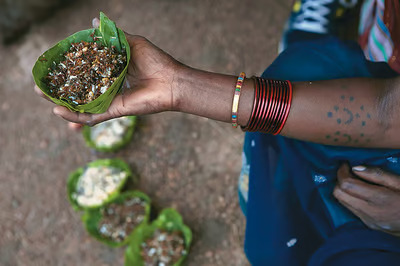(January 24, 2024) “Now this is what I have travelled into the wild for, the chutney,” says Michelin-star chef Gordon Ramsay in his documentary when he travelled to India in 2010. Clad in a blue tee and beige cargo pants, he tries the red ant chutney served on a leaf. “It’s hot but absolutely delicious,” he remarks, adding, “I am never going to touch mango chutney for the rest of my life.” Keen to know what makes the chutney so delicious, he finds himself escorted to a nearby jungle where a man climbs up a tree and cuts a branch that has what looks like a nest. Upon closer examination, he finds that it’s a nest for fire ants – and the chutney in question is Odisha’s Kai Chutney which has bagged the GI tag recently for its unique taste and texture.
Rich in protein, zinc, vitamin B-12, calcium, potassium, magnesium, iron et al, the Kai chutney, made from weaver ants, is found in the Similipal forests of Mayurbhanj district and has become a quintessential part of their culinary culture. If experts are to be believed, the savoury chutney helps boost the immune system and prevent diseases. Early this month, red ant chutney was awarded GI (Geographical Indication) tag for its exceptional health benefits and nutritional value. The tag serves to safeguard the unique flavour profile, preventing the dilution or replication of the dish, and the global recognition will help pave a deeper understanding of the superfood.
The making of the chutney
In the Mayurbhanj district, numerous tribal families earn a livelihood through the collection and sale of these insects and chutneys. They have cleverly included red ants in their daily lives by harvesting and making tasty dishes that highlight their unique flavours, finding sustainable and innovative ways to use this natural resource. They collect kai pimpudi (red weaver ants) and their eggs from nests, meticulously clean them before making a semi-solid paste chutney by grinding a blend of salt, ginger, garlic, and chilies in a pestle mortar, which increases its shelf live to one year.

“The chutney is popular not just for its delicious taste but also for its medicinal properties. It addresses coughs, colds, aches and pains. The ants’ high levels of formic acid, amped up by seasonings, make this chutney extremely hot,” Pobitra Mandal, a Mayurbhanj native said in an interview, adding that ants are tastiest as larvae or adults. “This is when the ants are optimally developed and produce maximum flavour.”
About 500 tribal families make a living by collecting and selling these insects, along with a chutney made from them. Due to high demand, they can sell large amounts at village markets and fairs. The price for a kilogram of live kai pimpudi is around ₹400-600, and the chutney sells for ₹1,000.
According to Nayadhar Padhial, the secretary of Mayurbhanj Kai Society, each year around three quintals of kai pimpudi is collected by tribals from the forest in the district. “We started the society in 2018 to promote kai pimpudi chutney by organising tribal food festivals and awareness meetings,” he said in an interview.

Promoting the rich culture of the state
The red ant chutney is not just restricted to Odhisa but is a pivotal dish among the tribes of Chattisgarh’s Bastar region. Chefs from India and abroad often indulge in tours that showcase the process of harvesting and storing red ants in indigenous communities. Even the Belgadia Palace in Mayurbhanj takes pride in showcasing its culinary delight to the world. “Our property has its trees and we have enlisted a member of a local tribe to collect the ants from the trees. Then, our chef, also from a tribe, prepares the chutney the traditional way,” Sautam Pramanik said in an interview.

The recognition of red ant chutney with a GI tag has propelled Odisha’s superfood onto the global culinary map. This unique culinary creation, crafted by around 500 tribal families, not only showcases the innovative use of a natural resource but also highlights the rich culinary traditions of the region. With its distinctive flavors and sustainable harvesting practices, red ant chutney stands as a testament to the diverse and remarkable gastronomic offerings emerging from different corners of the world. This GI tag not only adds value to the local economy but also positions Odisha as a hub for culinary innovation, inviting global attention to the intriguing and delicious world of red ant-infused delicacies.




